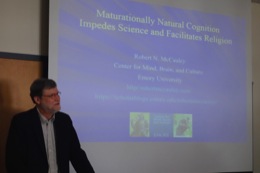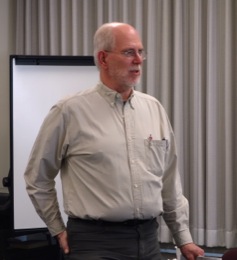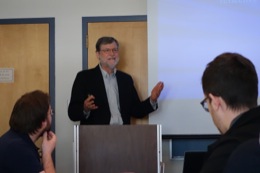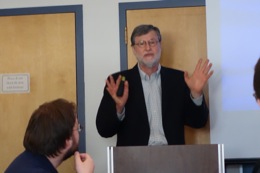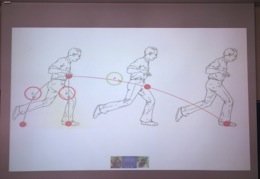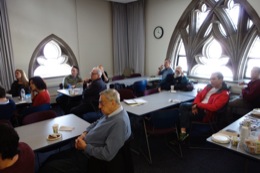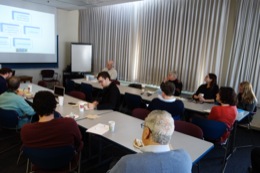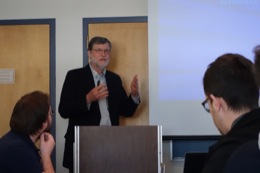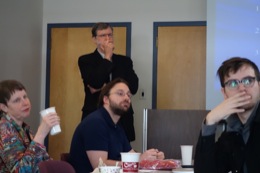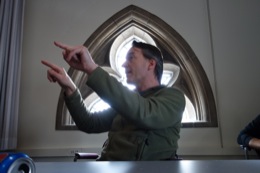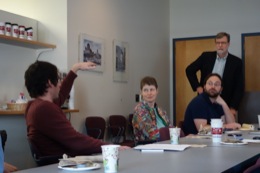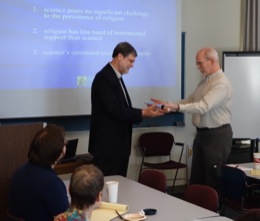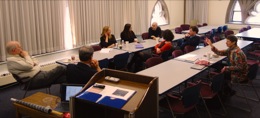

![]()
home
::: about
::: news
::: links
::: giving
::: contact
![]()
events
::: calendar
::: lunchtime
::: annual
lecture series
::: conferences
![]()
people
::: visiting fellows
::: postdoc fellows
::: resident fellows
::: associates
![]()
joining
::: visiting fellowships
::: postdoc fellowships
::: senior fellowships
::: resident fellowships
::: associateships
![]()
being here
::: visiting
::: the last donut
::: photo album
|
|
Cognitive Science of Religion
Robert McCauley, Lunchtime talk, March 6, 2015
Religious belief has been a long-term puzzle for me. In my early teens, when I first became capable of independent, critical thought, in a memorable moment, I determined that such belief is irrational. In the years following, I had many occasions to revisit that conclusion, but not to reverse it. There seems no way to square religious belief with the principle that one should believe that for which one has good evidence.
Thirty years ago, when I came to the US, my puzzlement deepened. Here in the US is a culture that is profoundly permeated with religious thinking to an extent I’d never experienced before. How can I understand this? There is more than mere rational thought at work. That much was clear. But what more?
This is surely a topic worthy of systematic study, but not by me. I am quite aware that religious belief is a delicate and sensitive subject. The very suggestion that I make here, that religious belief is a lapse of rationality, is deeply offensive to many. If, dear reader, you are one of the offended, then I apologize.
But I also ask you to reflect on the insults that religion routinely sends in my direction. Without religion, it is often said, we become stealing, raping, murdering monsters. That’s me they are talking about. Worse, atheists are engaged in an egregious and willful rebellion against the ultimate cosmic force for good. They are committing an inexcusable, absolute evil that will meet properly with the worst of punishments, the infinite tortures of hell.
When Bill Bechtel suggested that we have a talk from Bob McCauley on the cognitive science of religion, I welcomed the suggestion with more enthusiasm than Bill realized. I do want to hear what a systematic study will find. There is always a nagging worry. I think that even the most sophisticated of religious believers are being irrational; and, no doubt, they think the same of me. Perhaps I am being too hasty? But how?
Today, Bob is finally here. Bill will introduce him. For once I can sit in the room and just listen. Bill will keep an eye on the proceedings.
Bob is Director of the Center for Mind, Brain, and Culture and a professor of psychology (and religion and philosophy and anthropology). The direction of his analysis is decidedly psychological, as expected.
We have different modes of cognition, he asserts. His concern is to delineate one that is, if I heard him correctly, his own invention: “maturationally natural cognition.” These are intuitive forms of cognition that we develop early in life and apply automatically. Their domains of application range widely. Bob spent some time elaborating them. They include our facility with language, with face recognition, with a basic understanding of the impenetrability of objects and more.
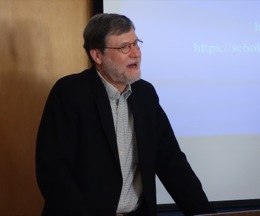
First, popular religion is readily facilitated by maturationally natural cognition. We readily identify minds in other people; and that facility to find minds extends cosmically to supernatural beings. We understand the virtue of avoiding contamination with harmful things. The reverse of that is a reverence for the sacred, which needs to be protected from contamination by us.
Second, science is impeded by maturationally natural cognition. For the representations of science are radically counterintuitive. That needed little argument for an audience of philosophers of science. So Bob hurried. It is initially incredible that a wooden table is mostly empty space, that our earth spins at 1000 miles per hour and that invisible micro-organisms can kill big organisms like us.
All this is a good start. But the story so far has a weakness. The examples involve the cognition of children. Adults routinely correct their childish misconceptions. So why are these not corrected? If ever I thought that trees think and gardens have invisible elves, I no longer do. So why haven’t we made the corresponding correction for the invisible forces of the supernatural?
Bob now turned to material that would address this worry. He started to report studies on adults who should know better, but stick with the mistaken deliverances of maturationally natural cognition.
One study quizzed university students, after they had taken a first year mechanics class and should know the answer. A runner drops a ball. Does it fall with the runner? Or is it left behind? 25% of the students gave the second, incorrect answer.
Now we turn to subjects who have doctorates in physics and chemistry. They are asked to endorse teleologically loaded questions: “Trees produce oxygen in order that that animals can breathe.” and “The ozone layer is there in order to protect the earth from ultra-violet radiation.”
When the subjects are stressed by being given little time to respond, their rate of endorsement of these mistakes jumps from 10% to 30%.
There was more in the talk, a lot more, and Bob did not stop until after 1pm. He concluded with an ominous remark: the continuance of science is fragile.
When question time came, since I was not chairing, for once I could ask the first question. And it was one I was eager to ask. I was not convinced that Bob had closed the gap between children and adults.
“My question is based on the presumption that religious belief is irrational…”
“I don’t agree with that.” Bob interjected.
My question proceeded: "I know many philosophers of science who are also quite religious. Given that they are experts in rationality, how is that possible? What are they thinking? What do they say when you ask them, as you surely must?”
I then admitted my cowardice. I really do want to know, but I had never mustered the courage to ask my colleagues, since I could see no way to ask that was not quite insulting! And, uncharitably, I expected the answer to be an unilluminating obsfucation.
Bob’s answer recalled how we easily fall into religious beliefs as children and he began to detail a false belief experiment conducted with four-year-olds.
“But the philosophers of science are not four-year-olds. . .” I interjected.
Bob continued. After quite some more elaboration, Bob settled on what seemed to me to be the answer in summary: we underestimate the comparative independence of the modes of cognition used in science and in maturationally natural cognition.
There was no more time for my question. There was a long queue and little time. Bill moved us along.
We closed with the usual ceremony.
Then Bob settled down in the seminar room for a more leisurely discussion with anyone who wanted to linger. Many did want to linger.
I popped in from time to time and joined in. I did get to ask: “So just why did you disagree with my claim that religious belief is irrational.” I really did want to know; and he told me.
John D. Norton
